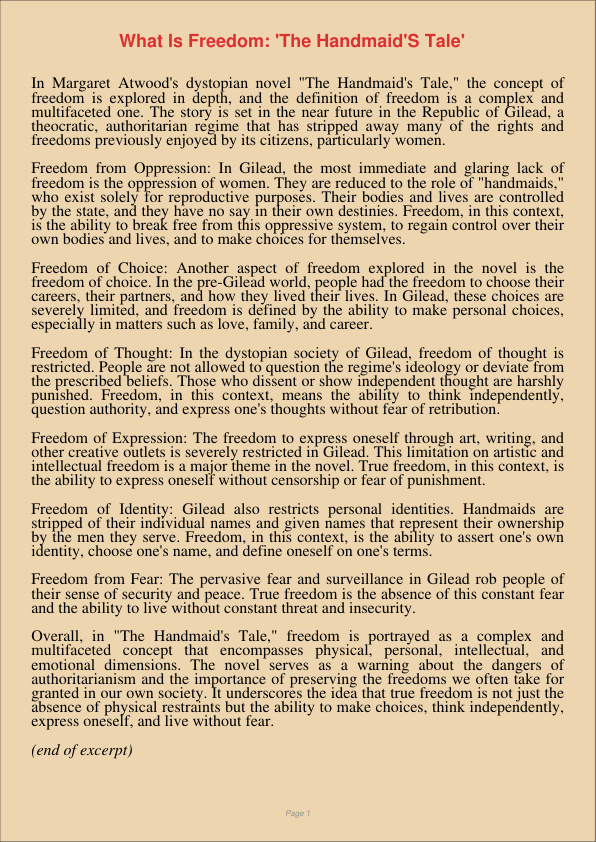In Margaret Atwood’s dystopian novel “The Handmaid’s Tale,” the concept of freedom is explored in depth, and the definition of freedom is a complex and multifaceted one. The story is set in the near future in the Republic of Gilead, a theocratic, authoritarian regime that has stripped away many of the rights and freedoms previously enjoyed by its citizens, particularly women.
Freedom from Oppression: In Gilead, the most immediate and glaring lack of freedom is the oppression of women. They are reduced to the role of “handmaids,” who exist solely for reproductive purposes. Their bodies and lives are controlled by the state, and they have no say in their own destinies. Freedom, in this context, is the ability to break free from this oppressive system, to regain control over their own bodies and lives, and to make choices for themselves.
Freedom of Choice: Another aspect of freedom explored in the novel is the freedom of choice. In the pre-Gilead world, people had the freedom to choose their careers, their partners, and how they lived their lives. In Gilead, these choices are severely limited, and freedom is defined by the ability to make personal choices, especially in matters such as love, family, and career.
Freedom of Thought: In the dystopian society of Gilead, freedom of thought is restricted. People are not allowed to question the regime’s ideology or deviate from the prescribed beliefs. Those who dissent or show independent thought are harshly punished. Freedom, in this context, means the ability to think independently, question authority, and express one’s thoughts without fear of retribution.
Freedom of Expression: The freedom to express oneself through art, writing, and other creative outlets is severely restricted in Gilead. This limitation on artistic and intellectual freedom is a major theme in the novel. True freedom, in this context, is the ability to express oneself without censorship or fear of punishment.
Freedom of Identity: Gilead also restricts personal identities. Handmaids are stripped of their individual names and given names that represent their ownership by the men they serve. Freedom, in this context, is the ability to assert one’s own identity, choose one’s name, and define oneself on one’s terms.
Freedom from Fear: The pervasive fear and surveillance in Gilead rob people of their sense of security and peace. True freedom is the absence of this constant fear and the ability to live without constant threat and insecurity.
Overall, in “The Handmaid’s Tale,” freedom is portrayed as a complex and multifaceted concept that encompasses physical, personal, intellectual, and emotional dimensions. The novel serves as a warning about the dangers of authoritarianism and the importance of preserving the freedoms we often take for granted in our own society. It underscores the idea that true freedom is not just the absence of physical restraints but the ability to make choices, think independently, express oneself, and live without fear.

「真诚赞赏,手留余香」
真诚赞赏,手留余香
使用微信扫描二维码完成支付
